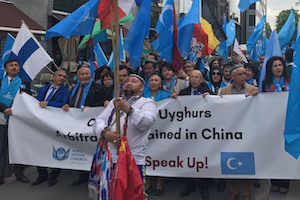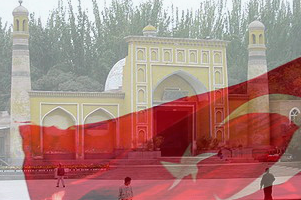Has Turkey Outfoxed China in Azerbaijan to become a rising Eurasian power?
By Michaël Tanchum
January 19, 2021
Turkey's decision to provide an unprecedented level of military assistance to Azerbaijan empowered Baku to achieve a resounding victory in the 2020 Nagorno-Karabakh War, changing the geopolitical rules of the game in the South Caucasus. Moreover, the war has enhanced Ankara's ability to project its influence in Central Asia. Benefiting from its inclusion in the Chinese-led BRI network of connectivity across Central Asia, Turkey may have outfoxed China in Azerbaijan to become a rising Eurasian power. Although Russia now has to tolerate the presence of Turkish troops on Azerbaijani soil, China may be the big strategic loser in the war's outcome.

Turkey's Strong Rebuke of China's Uighur Policy Reveals Inherent Limit of Sino-Turkish Cooperation
By Micha’el Tanchum
February 20, 2019
Turkey's recent stern rebuke of China's treatment of its Turkic Muslim, Uighur minority constitutes a stunning policy reversal by Ankara after more than three years of accommodating Beijing's policies in Xinjiang province. The Turkish government's belated condemnation of China's internment camps in Xinjiang was prompted by an erroneous claim of the death in detention of a revered performer of Uighur traditional music. The timing was also motivated by the mounting pressure ahead of Turkey's March 31stelections from growing Turkish nationalist outrage over the Uighur's plight. Ankara's reversion to the nationalist line on Xinjiang reveals the inherent limit of Sino-Turkish cooperation, as Turkish nationalism's core element of Pan-Turkic solidarity poses an enduring threat to Beijing's vital interests in Xinjiang and its strategic ambitions across Turkic Central Asia..

Turkey and China: Merging Realpolitik with Idealism
By Hay Eytan Cohen Yanarocak (vol. 8, no. 15 of the Turkey Analyst)
Despite the importance and improvement of multi-dimensional Turkish-Chinese relations, Turkish decision makers have had difficulties reconciling their Pan-Islamic ideological rhetoric and the demands of realpolitik. While Ankara recognizes the need to form good relations with China, its self-assigned role as the protector of “oppressed Muslims” has, so far, trapped Turkey between realpolitik and the purism of ideology. Having acknowledged this clash, President Recep Tayyip Erdoğan has moved to neutralize the discord that has existed between Turkey’s national interests and its Pan-Islamic ideological rhetoric. Erdoğan’s new China strategy promises to pave the way for solid, stable relations between Turkey and China.



